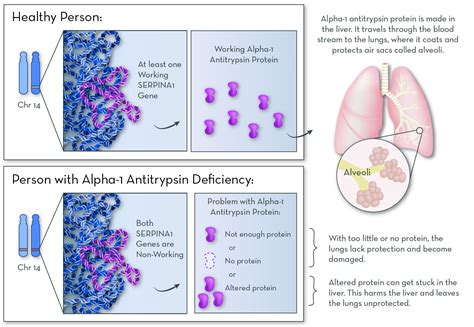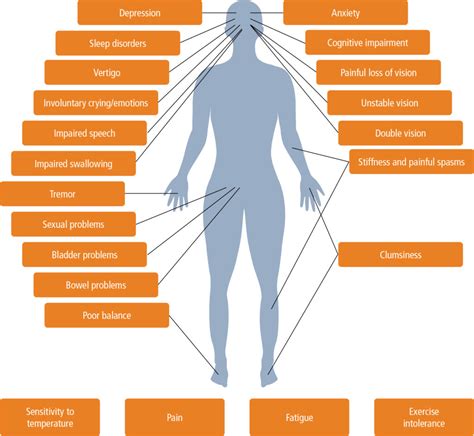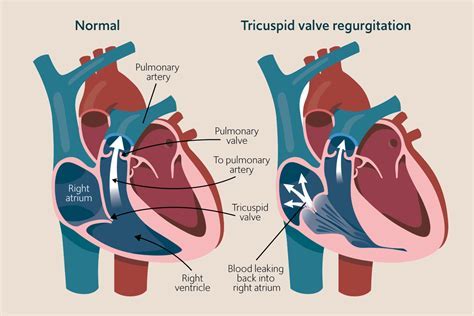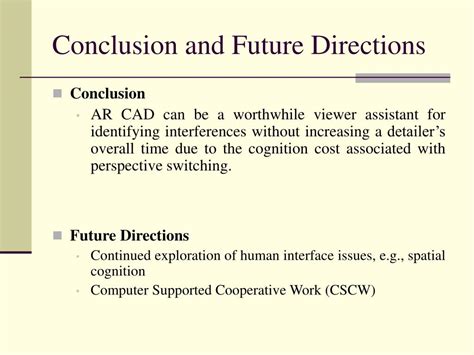Intro
Discover Alpha 1 Antitrypsin Deficiency, a genetic disorder affecting lung health, causing emphysema and liver disease, with symptoms and treatment options explained.
Alpha 1 antitrypsin deficiency is a rare genetic disorder that affects the lungs, liver, and other organs. It is a condition where the body does not produce enough of a protein called alpha 1 antitrypsin, which helps protect the lungs from damage. This deficiency can lead to a range of health problems, including chronic obstructive pulmonary disease (COPD), liver disease, and even certain types of cancer. In this article, we will delve into the world of alpha 1 antitrypsin deficiency, exploring its causes, symptoms, diagnosis, and treatment options.
The importance of understanding alpha 1 antitrypsin deficiency cannot be overstated. As a genetic disorder, it is essential to recognize the signs and symptoms early on, allowing for prompt medical attention and potentially life-saving interventions. Furthermore, research into this condition has far-reaching implications for our understanding of lung and liver diseases, as well as the development of novel therapeutic strategies. By shedding light on alpha 1 antitrypsin deficiency, we hope to empower patients, families, and healthcare professionals with the knowledge needed to navigate this complex condition.
As we explore the complexities of alpha 1 antitrypsin deficiency, it becomes clear that this condition is multifaceted and affects individuals in unique ways. The severity of symptoms can vary greatly, and the progression of the disease can be influenced by a range of factors, including lifestyle, environment, and access to medical care. Despite these challenges, advances in medical research and technology have led to significant improvements in diagnosis, treatment, and management of alpha 1 antitrypsin deficiency. In this article, we will examine the latest developments and breakthroughs in the field, providing a comprehensive overview of this fascinating and complex condition.
What is Alpha 1 Antitrypsin Deficiency?

Causes and Risk Factors
The causes of alpha 1 antitrypsin deficiency are rooted in genetics, with the condition being inherited in an autosomal codominant pattern. This means that a person can inherit one or two defective copies of the SERPINA1 gene, leading to varying degrees of alpha 1 antitrypsin deficiency. The risk factors for developing alpha 1 antitrypsin deficiency include: * Family history: Individuals with a family history of alpha 1 antitrypsin deficiency are at increased risk of developing the condition. * Genetic mutations: Mutations in the SERPINA1 gene can lead to alpha 1 antitrypsin deficiency. * Ethnicity: Alpha 1 antitrypsin deficiency is more common in individuals of European descent. * Age: Alpha 1 antitrypsin deficiency can affect individuals of all ages, although symptoms may not appear until later in life.Symptoms and Diagnosis

Diagnosing alpha 1 antitrypsin deficiency typically involves a combination of tests, including:
- Blood tests: To measure alpha 1 antitrypsin levels and detect genetic mutations.
- Imaging tests: Such as chest X-rays and CT scans to assess lung damage.
- Pulmonary function tests: To evaluate lung function and detect any abnormalities.
- Liver function tests: To assess liver damage and function.
Treatment and Management
Treatment for alpha 1 antitrypsin deficiency depends on the severity of the condition and the organs affected. Common treatment strategies include: * Augmentation therapy: To replace the deficient alpha 1 antitrypsin protein. * Bronchodilators: To help manage symptoms of COPD. * Oxygen therapy: To increase oxygen levels in the blood. * Liver transplantation: In cases of severe liver damage. * Lifestyle modifications: Such as quitting smoking, exercising regularly, and maintaining a healthy diet.Complications and Prognosis

The prognosis for alpha 1 antitrypsin deficiency varies depending on the severity of the condition and the effectiveness of treatment. With proper management and care, individuals with alpha 1 antitrypsin deficiency can lead active and fulfilling lives. However, if left untreated, the condition can progress rapidly, leading to severe complications and reduced life expectancy.
Current Research and Developments
Research into alpha 1 antitrypsin deficiency is ongoing, with scientists exploring new treatments and therapies to manage the condition. Some of the current areas of research include: * Gene therapy: To correct the genetic mutations that cause alpha 1 antitrypsin deficiency. * Stem cell therapy: To repair damaged lung tissue and promote regeneration. * Small molecule therapies: To target specific molecular pathways involved in the disease.Lifestyle Modifications and Self-Management

Support and Resources
Living with alpha 1 antitrypsin deficiency can be challenging, but there are many resources available to support individuals and families affected by the condition. Some of these resources include: * Support groups: To connect with others who are living with alpha 1 antitrypsin deficiency. * Online forums: To share experiences and ask questions. * Patient organizations: To access information, resources, and advocacy. * Healthcare professionals: To receive guidance, support, and medical care.Conclusion and Future Directions

We invite you to share your thoughts and experiences with alpha 1 antitrypsin deficiency in the comments below. If you have any questions or concerns, please do not hesitate to reach out. By working together, we can raise awareness and promote understanding of this important condition.
What is alpha 1 antitrypsin deficiency?
+Alpha 1 antitrypsin deficiency is a genetic disorder caused by mutations in the SERPINA1 gene, leading to a deficiency of the alpha 1 antitrypsin protein.
What are the symptoms of alpha 1 antitrypsin deficiency?
+The symptoms of alpha 1 antitrypsin deficiency can vary, but common symptoms include shortness of breath, wheezing, coughing, chest tightness, fatigue, weight loss, and jaundice.
How is alpha 1 antitrypsin deficiency diagnosed?
+Diagnosing alpha 1 antitrypsin deficiency typically involves a combination of tests, including blood tests, imaging tests, pulmonary function tests, and liver function tests.
What are the treatment options for alpha 1 antitrypsin deficiency?
+Treatment options for alpha 1 antitrypsin deficiency include augmentation therapy, bronchodilators, oxygen therapy, liver transplantation, and lifestyle modifications.
What is the prognosis for alpha 1 antitrypsin deficiency?
+The prognosis for alpha 1 antitrypsin deficiency varies depending on the severity of the condition and the effectiveness of treatment. With proper management and care, individuals can lead active and fulfilling lives.
